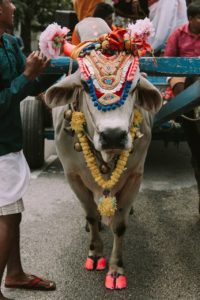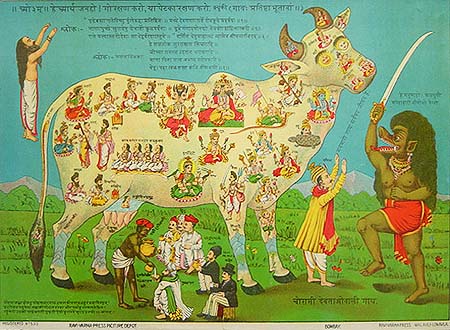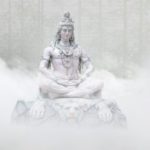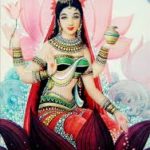Hindus revere cows as a symbol or life. Unlike many misconceptions about the significance of cows in Hindu culture, cows are not nor have they ever been worshiped. In ancient India, although oxen and bulls were slaughtered for meat and sacrificed to the Gods, it was unacceptable to kill a cow that produced milk. One possible reason for this practice was that Aditi (mother of gods) identified with milk-producing cows in the Rigveda.
 Consuming meat was permitted, however, scripture has always promoted vegetarianism. When the religions Buddhism and Jainism arose Hindus stopped eating beef. Since cows were thought to be God’s gift to mankind to provide food, fuel, and life, it became sacrilegious to eat this gift that God had sent. Although there are religious implications for this, there are also reasons of necessity. Cows provided milk, browned butter for lamps, and fuel. Slaughtering a cow for sacrifice or food was expensive and with each death also died all the uses cows fulfilled.
Consuming meat was permitted, however, scripture has always promoted vegetarianism. When the religions Buddhism and Jainism arose Hindus stopped eating beef. Since cows were thought to be God’s gift to mankind to provide food, fuel, and life, it became sacrilegious to eat this gift that God had sent. Although there are religious implications for this, there are also reasons of necessity. Cows provided milk, browned butter for lamps, and fuel. Slaughtering a cow for sacrifice or food was expensive and with each death also died all the uses cows fulfilled.
Cows as gifts for Brahmans
In the early centuries AD, cows were designated as gifts for Brahmans, which were high castle priests. Killing a cow, was like killing a Brahman who they had been bestowed too. In literature, Krishna stories exalted the sanctity of cows and reinforced the belief that they were sacred creatures.
Abstain from eating beef
Today, Hinduism teaches to abstain from eating beef. Most families in Hindu culture own at least one cow that is considered equal to other family members. Cows as a symbol of life offer five important products: milk, curds, ghee butter, urine, and dung. These items are all used in worship and in extreme cases of penance.
Milk provides nourishment for growing children, so cows have become thought of as surrogate mothers nourishing all mankind. Cow dung is the largest source of household energy in India. At times, dung is used for a tilak, or a mark on the forehead. It is considered the nature of the earth and note vile like most Western cultures would consider excrement. Since cows are considered cleansers, cow dung is considered a disinfectant.
Most often, cows roam the streets of India starving and uncared for, not because they are not held sacred, but because they are considered almost a taboo in Hindu culture. On one specific day, Gopastami, cows are washed and decorated and given gifts hoping that gifts of life will be prosperous.
Sources:
http://www.religionfacts.com/hinduism/things/cow.htm
http://hinduism.about.com/library/weekly/aa101800c.htm






